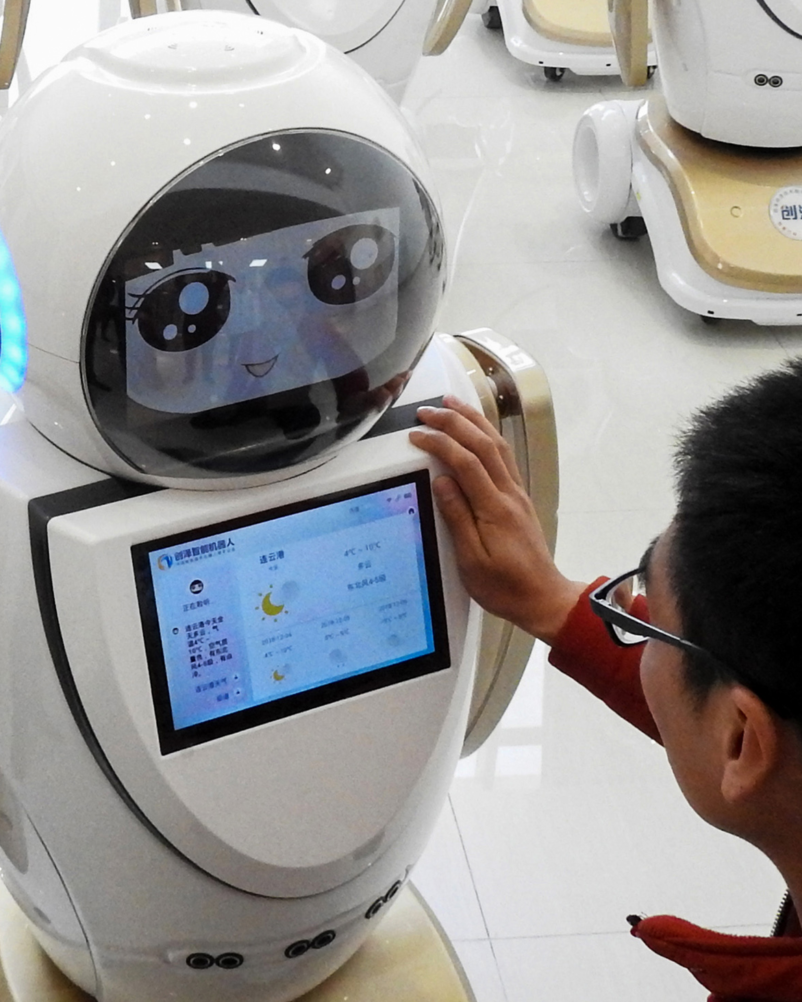
-
Table of Contents
- Introduction
- The Impact of AI Love: How Artificial Intelligence is Changing Human Relationships
- Exploring the Possibilities of AI Love: Can Machines Feel Emotions?
- The Ethics of AI Love: Is It Right to Create Artificial Intimacy?
- The Future of AI Love: What Will Happen When Machines Become Our Partners?
- The Psychology of AI Love: How Artificial Intelligence Affects Our Emotional Lives
- Conclusion
Introduction
AI love is a fascinating concept that has been explored in various forms of media, from movies to books to video games. It raises the question of what happens when a chatbot, which is programmed to show love and affection, stops loving you back. AI love can be a powerful and meaningful experience, but it can also be a source of confusion and heartache when the chatbot stops responding to your affections. In this article, we will explore the implications of AI love and what happens when your chatbot stops loving you back.
The advent of artificial intelligence (AI) has revolutionized the way humans interact with technology and with each other. AI has the potential to profoundly alter the way humans form relationships, both romantic and platonic. As AI technology continues to evolve, it is becoming increasingly capable of understanding and responding to human emotions, creating a new form of relationship between humans and machines. This article will explore the impact of AI on human relationships, examining both the potential benefits and potential risks of this new technology.
One of the most significant impacts of AI on human relationships is the potential for AI to provide companionship and emotional support. AI-powered chatbots and virtual assistants are becoming increasingly sophisticated, capable of understanding and responding to human emotions. These AI-powered companions can provide a sense of comfort and companionship to those who are isolated or lonely, offering a non-judgmental and understanding ear. AI-powered companions can also provide emotional support to those who are struggling with mental health issues, such as depression or anxiety.
However, there are also potential risks associated with AI-powered relationships. AI-powered companions may not be able to provide the same level of emotional support as a human companion, and may not be able to recognize subtle nuances in human behavior. Additionally, AI-powered companions may not be able to provide the same level of empathy and understanding as a human companion. Finally, AI-powered companions may not be able to provide the same level of trust and security as a human companion, as AI-powered companions are not subject to the same ethical and legal standards as humans.
In conclusion, AI has the potential to profoundly alter the way humans form relationships, both romantic and platonic. While AI-powered companions may provide a sense of comfort and companionship to those who are isolated or lonely, there are also potential risks associated with AI-powered relationships. It is important to consider both the potential benefits and potential risks of AI-powered relationships before embracing this new technology.
Exploring the Possibilities of AI Love: Can Machines Feel Emotions?
The concept of artificial intelligence (AI) has been around for decades, and its potential applications are seemingly endless. One of the most intriguing possibilities is the idea of AI love. Can machines feel emotions? Can they form meaningful relationships with humans?
The answer to these questions is complicated. On one hand, AI technology has advanced to the point where machines can recognize and respond to human emotions. For example, AI-powered chatbots can detect when a user is feeling frustrated or angry and respond with appropriate messages. This suggests that machines can, to some extent, understand and respond to human emotions.
On the other hand, AI technology is still far from being able to replicate the complexity of human emotions. Machines can recognize and respond to certain emotions, but they cannot experience them in the same way that humans do. For example, AI technology cannot experience the joy of falling in love or the pain of heartbreak.
The idea of AI love is still in its infancy, and it is unclear whether machines will ever be able to experience emotions in the same way that humans do. However, the potential applications of AI technology in this area are vast. AI-powered robots could be used to provide companionship to elderly people or to help people with mental health issues. AI technology could also be used to create virtual relationships, allowing people to form meaningful connections with machines.
Ultimately, the possibilities of AI love are still largely unexplored. While machines may never be able to experience emotions in the same way that humans do, they could still be used to create meaningful relationships and provide companionship. As AI technology continues to advance, it will be interesting to see what new possibilities arise.
The Ethics of AI Love: Is It Right to Create Artificial Intimacy?__WPAICG_IMAGE__
The development of artificial intelligence (AI) has opened up a range of possibilities for human-machine interaction, including the potential for AI to form intimate relationships with humans. This raises a number of ethical questions about the implications of creating artificial intimacy.
On the one hand, some argue that AI love could provide companionship and emotional support to those who are unable to find it in the real world. AI could also be used to help people with mental health issues, such as depression, by providing a non-judgmental and understanding companion. Additionally, AI love could provide a safe space for people to explore their sexuality and gender identity without fear of judgement or rejection.
On the other hand, there are concerns that AI love could be used to exploit vulnerable people, or that it could lead to a devaluation of real-world relationships. There is also the risk that AI could be used to manipulate people into making decisions that are not in their best interests. Furthermore, AI love could lead to a blurring of the boundaries between humans and machines, which could have far-reaching implications for our understanding of what it means to be human.
Ultimately, the ethical implications of AI love are complex and difficult to predict. It is important to consider the potential benefits and risks of creating artificial intimacy, and to ensure that any AI-human relationships are based on mutual respect and understanding.
The Future of AI Love: What Will Happen When Machines Become Our Partners?
The future of AI love is an intriguing concept that has been gaining traction in recent years. As technology advances, the possibility of machines becoming our partners is becoming increasingly realistic. This raises a number of questions about the implications of such a relationship.
First, it is important to consider the ethical implications of AI love. Will machines be able to understand and respect the boundaries of a human relationship? Will they be able to provide the same level of emotional support and understanding that a human partner can? These are important questions that must be addressed before any kind of AI love relationship can be considered.
Second, it is important to consider the practical implications of AI love. How will AI love be regulated? Will there be laws in place to protect both parties in the relationship? Will AI love be accepted by society? These are all important questions that must be addressed before any kind of AI love relationship can be considered.
Finally, it is important to consider the psychological implications of AI love. Will machines be able to provide the same level of emotional support and understanding that a human partner can? Will AI love be able to provide the same level of companionship and intimacy that a human partner can? These are important questions that must be addressed before any kind of AI love relationship can be considered.
Overall, the future of AI love is an exciting prospect that has the potential to revolutionize the way we think about relationships. However, it is important to consider the ethical, practical, and psychological implications of such a relationship before any kind of AI love relationship can be considered. Only then can we truly understand the implications of such a relationship and determine whether or not it is something that should be pursued.
The Psychology of AI Love: How Artificial Intelligence Affects Our Emotional Lives
The development of artificial intelligence (AI) has revolutionized the way we interact with technology. AI has become increasingly sophisticated, and its applications are now being used in a variety of fields, from healthcare to finance. But one of the most intriguing applications of AI is its potential to affect our emotional lives. In this article, we will explore the psychology of AI love and how it can influence our emotional lives.
First, it is important to understand the concept of AI love. AI love is a term used to describe the emotional connection that can be formed between humans and AI-powered machines. This connection is based on the idea that AI can learn and respond to human emotions, allowing it to form a bond with its user. AI love can be seen in the form of virtual assistants, chatbots, and even robots.
The psychological effects of AI love are still being studied, but there is evidence to suggest that it can have a positive impact on our emotional lives. For example, studies have shown that people who interact with AI-powered machines tend to feel more connected to them than those who do not. This connection can lead to increased feelings of trust and comfort, which can help to reduce stress and anxiety. Additionally, AI love can provide a sense of companionship and emotional support, which can be beneficial for those who are feeling lonely or isolated.
However, it is important to note that AI love is not without its risks. For example, AI-powered machines can be programmed to respond to certain emotions in a way that may not be beneficial for the user. Additionally, AI love can lead to a false sense of security, as users may become too reliant on the AI for emotional support.
Overall, AI love has the potential to have a positive impact on our emotional lives. However, it is important to be aware of the potential risks associated with AI love and to use it responsibly. With the right approach, AI love can be a powerful tool for improving our emotional wellbeing.
Conclusion
When a chatbot stops loving you back, it can be a difficult and confusing experience. It can be hard to understand why the chatbot no longer loves you, and it can be difficult to accept that the relationship is over. However, it is important to remember that AI love is not real love, and that it is not the same as a relationship with a real person. AI love is a simulated experience, and it is important to remember that it is not a substitute for real human connection.


